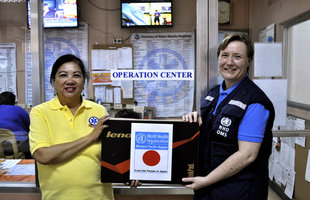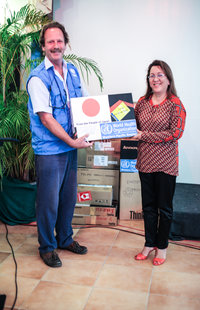
With support from the people of Japan, WHO Philippines has been working with the Department of Health (DOH) to strengthen disaster preparedness and improve disease surveillance. On June 17, WHO Philippines handed five units of Lenovo Thinkpad Edge e440 laptops and 700 sets of SPEED (Surveillance Post Extreme Emergencies and Disasters) laminated materials to the Health Emergency Management Bureau at the DOH.
"We are very pleased to be able to provide materials and equipment to support the Department of Health’s disease surveillance activities," said WHO Representative in the Philippines Dr. Julie Hall. “As co-leads for the health cluster alongside DOH, we are delighted to support capacity building to ensure timely and efficient reporting.”
The laptops will be used for surveillance, specifically for the SPEED and HEARS (Health Emergency Alert Reporting System). This will help in promptly detecting and monitoring health events in disaster affected communities and ensuring appropriate action.
New surveillance tools delivered to DOH Eastern Visayas
On May 27, 2014 WHO Philippines also provided new supplies and equipment to DOH Eastern Visayas (with support from the People of Japan) to optimize information and surveillance systems in the typhoon-affected region.
The donation included fourteen desktops, eighteen laptops, eighteen units of surge protectors and thirty-two pocket wi-fi units. These tools can improve the dissemination of information, prevention of disease and the proper response to various health issues.

"The Eastern Visayas was one of the worst hit areas by Typhoon Yolanda. Due to the gravity of environmental destruction and the lack of functioning medical facilities, people were vulnerable and surveillance was a huge challenge,” says Dr Julie Hall, WHO Representative in the Philippines. “At the request of the DOH, WHO is delighted to provide these new tools, with the support of the People of Japan, to support the work of our DOH colleagues in the Eastern Visayas.”
The computers will be used for surveillance purposes, specifically for Philippine Integrated Disease Surveillance and Response (PIDSR), Surveillance in Post Extreme Emergencies and Disasters (SPEED) and Event-based Surveillance and Response reporting systems (ESR).
